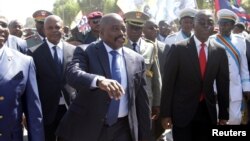The United Nations Security Council expressed concern on Thursday over the arrest of political opposition members in Democratic Republic of Congo and urged the president to hold elections by the end of the year as required by the constitution.
The Congolese government has said it is unlikely it will be able to hold elections on time for logistical reasons as opponents of President Joseph Kabila accuse him of trying to cling to power.
Kabila, who has been in power since 2001, is barred by the constitution from standing for a third term in the poll scheduled for November. But a top Kabila ally has raised the possibility of a referendum to allow him to run.
In a resolution to renew U.N. sanctions, the 15-member Security Council emphasized the protection of fundamental freedoms and human rights in order to pave "the way for peaceful, credible, inclusive, transparent and timely elections in the DRC, particularly presidential and legislative elections by November 2016, in accordance with the Constitution."
The resolution also expanded the sanctions criteria to allow the council to blacklist people for committing rights abuses.
Congolese U.N. Ambassador Ignace Gata Mavita wa Lufuta said his country did not believe the resolution adopted on Thursday should have referred to the electoral process. He said Kabila's government was focused on organizing peaceful polls and that "should not be interpreted as a pretext to defer the elections."
"The experience drawn from two previous elections requires that we find the necessary conditions to organize proper elections that are not affected by violence," he told the council, warning the resolution could revive political tensions.
The council expressed deep concern at increased restrictions on freedom of expression and on the political space in Democratic Republic of Congo, specifically the recent arrests and detention of political opposition and civil society members.
The U.S. government imposed sanctions on a senior Congolese police official on Thursday for his role in what it described as the violent suppression of opposition to Kabila's government.





